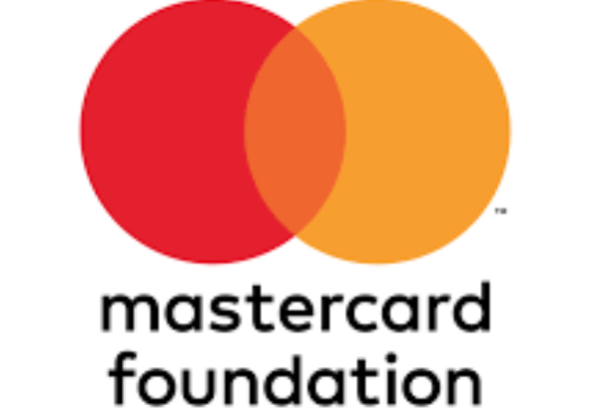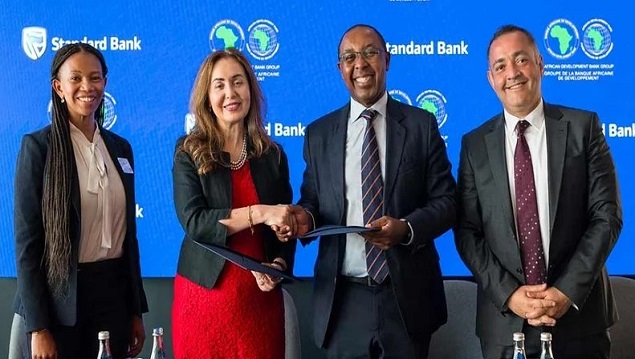E-Financial
IFC, Mastercard Foundation Launch Handbook to Promote Financial Inclusion

IFC, a member of the World Bank Group, together with the Mastercard Foundation, has launched the Digital Financial Services for Agriculture Handbook to support the expansion of financial inclusion to smallholder farmers and agricultural value chain actors in Sub-Saharan Africa.
Financial inclusion has expanded dramatically in the region over the past 10 years due to the rapid evolution of mobile money and agent banking. But access to formal financial services remains limited in rural areas and in the agricultural sector.
Although agriculture contributes to about 18 percent of GDP across Sub-Saharan Africa, only an estimated one percent of bank lending in the region is allocated to the agricultural sector.
Riadh Naouar, IFC Manager for Financial Institutions Group Advisory in Sub-Saharan Africa, said “This handbook will help financial services providers better understand smallholder farmers and other actors in the agricultural value chains, and how to develop and launch sustainable financial services for them.
“Digital services can help farmers better access inputs, weather updates, pricing information, and markets.”
This is the fourth handbook on how to develop digital financial services published by the Partnership for Financial Inclusion, a $37.4 million joint initiative of IFC and the Mastercard Foundation to expand microfinance and advance digital financial services in Sub-Saharan Africa.
The handbook was officially launched yesterday at the 2018 Partnership Knowledge Event in Dar es Salaam, Tanzania, which brings together about 200 industry practitioners and experts to explore the future of financial inclusion in Africa.
In a joint call to the industry, Sergio Pimenta, IFC Vice President, Middle East and Africa, and Ann Miles, Director, Thought Leadership and Innovation, Mastercard Foundation, urged stakeholders to move beyond the remarkable advances for financial inclusion of recent years.
“It is now time for the regional financial industry, investors, development finance institutions, and regulators to make a final push and build on the gains made so far so that the benefits of formal financial services extend to all African adults.”
There is an emerging body of evidence on the impact that digital financial inclusion can have on inclusive economic growth and development.
A Partnership study showed that smallholder cocoa farmers in Côte d’Ivoire who saved regularly were better able to feed their families than those who did not save, irrespective of the farmers’ annual income.
The same study also revealed that many smallholder cocoa farmers felt ‘socially excluded’ by traditional banks but were generally accepting of agent banking and digital services.
The Digital Financial Services for Agriculture Handbook is available online, together with all other research reports and knowledge publications of the Partnership for Financial Inclusion.
E-Financial
Firm Plans Digital Platform for Easy Access to Loans

Financial services firm, Spring Sky Finance Company is set to launch its digital banking services in Nigeria this week.

A statement by the company noted that this innovative initiative aims to streamline loan processing and enhance access to credit for businesses and individuals, thereby mitigating economic challenges.
According to Dr. Helen Oritsejafor, the chairman of the company, “the institution is driven by innovation and a commitment to empowering individuals, businesses, and communities”.
Oritsejafor emphasised that the finance company is dedicated to providing innovative financial solutions, focusing on customer-centric services that cater for both businesses and individuals.
“Our mission is to empower individuals, businesses, and communities to soar to new heights through innovative financial solutions. We aim to bring banking closer to home with our digital banking architecture, providing financial services to macro and micro-economies,” Oritsejafor stated.
She added that the company’s goal is to become a leading provider of financial services for macro, micro, and small business clients.
“With a strong focus on financial inclusion, Spring Sky Finance seeks to provide tailored solutions to businesses and individuals, enabling them to achieve financial security, build wealth, and realise their dreams,” Oritsejafor said.
She concluded that the company’s digital banking solutions are a key part of its strategy to enhance accessibility and efficiency.
“At Spring Sky, we lead, and others follow. We are positioned to redefine the banking landscape by providing flexible, technology-driven financial solutions that cater for the evolving needs of businesses and individuals in both micro and macroeconomic sectors,” Oritsejafor concluded.
E-Financial
AfDB, Standard Bank Unite to Support SMMEs and Boost Trade

The African Development Bank Group and Standard Bank Group (SBG) on Monday signed a landmark financial agreement to enhance funding for small, medium, and micro enterprises (SMMEs) and expand trade across Africa.

The agreement includes a R3.6 billion investment in a social bond and a $200 million Risk Participation Agreement (RPA) for Standard Bank of South Africa Limited (SBSA). This initiative strengthens Standard Bank’s lending capacity, ensuring greater access to finance for SMMEs, a critical driver of economic growth and job creation in South Africa.
The social bond investment promotes inclusive economic development, particularly for SMMEs with a turnover below R300 million and loan sizes under R40 million. This financing will support up to 4,000 businesses, helping them scale operations, create jobs, and contribute to economic resilience.
Kenny Fihla, Deputy Chief Executive Officer of Standard Bank Group and Chief Executive Officer of SBSA, welcomed the investment, stating: “This landmark partnership strengthens our ability to support SMMEs, the backbone of South Africa’s economy. With approximately 3.2 million SMMEs accounting for 60% of jobs, ensuring access to finance is crucial. This initiative aligns with our Sustainable Finance Framework and our commitment to financial inclusion.”
In addition to the social bond, the $200 million RPA enhances trade finance across Africa, focusing on Low-Income Countries and Transition States. This agreement enables local banks to increase lending by sharing risk, bridging the trade finance gap, and promoting intra-African trade.
Leila Mokaddem, Director General for Southern Africa at the African Development Bank, highlighted the broader impact: “This collaboration marks a significant milestone in our long-standing partnership and is a testament to our shared commitment to supporting SMMEs’ growth and enhancing trade finance across Africa.
“Expanding financial inclusion and trade opportunities empowers businesses to drive economic transformation and regional integration. The Standard Bank Group remains a strategic partner in our shared vision for economic development on the continent.”
This initiative aligns with the African Development Bank’s Ten-Year Strategy (2024–2033), which prioritises industrialisation, regional integration, and improving the quality of life in Africa. It also supports Standard Bank’s Sustainable Finance Framework, reinforcing both institutions’ commitment to fostering green and inclusive growth.
“We are proud of this transaction, demonstrating our shared commitment to sustainable financing. By supporting businesses, we create long-term economic opportunities and financial resilience,” stated Ahmed Attout, Director of the Financial Sector Development Department at the African Development Bank.
Kenny Fihla reaffirmed the significance of the collaboration: “By providing much-needed capital, we are helping enterprises overcome challenges and thrive. This partnership illustrates the power of collaboration in driving meaningful economic and social change in Africa.”
E-Financial
Analyst Predict Fidelity to meet Recaptalization Threshold ahead of Regulatory Deadline

Fidelity Bank Plc is making impressive strides on its path to fulfilling the recapitalization targets set by the Central Bank of Nigeria (CBN). With a successful first phase of its capital-raising initiative that recorded over 238% over subscription and share price growth of over 100% evidencing a huge surge in investor confidence for the bank.

Following the successful completion of phase 1 of its capital raise, the bank is exceptionally well-positioned to not only meet the regulatory threshold strengthen but also fuel its growth trajectory.
With the recent conclusion of its equity capital raise through a Public Offer and Rights Issue, collectively known as the Combined Offer. The response has been nothing short of extraordinary, with the Public Offer oversubscribed by an astounding 237.92%. This translates to 107,588 valid applications for a total of 23,768,724,000 ordinary shares, amounting to ₦231.7 billion. The Rights Issue also shone brightly, achieving a remarkable 137.73% subscription rate with 6,903 valid applications for 4,407,252,795 ordinary shares, totaling ₦40.7 billion.
Dr. Nneka Onyeali-Ikpe, the Managing Director and CEO of Fidelity Bank, expressed heartfelt gratitude for the overwhelming support from investors, stating, “The positive results recorded in our Combined Offer are a testament to the strength of the Fidelity Bank franchise in the capital market.” Such a robust response not only underscores investor confidence but also reaffirms the bank’s unwavering commitment to delivering innovative financial solutions and sustainable returns to its stakeholders.
Following this remarkable success, Fidelity Bank has secured shareholder approval to launch the second phase of its capital-raising initiatives. This includes a significant increase in the bank’s issued share capital from ₦26.7 billion to ₦36.7 billion. Shareholders endorsed this expansion during an Extraordinary General Meeting on February 6, 2025, approving the creation of an additional 20 billion ordinary shares of ₦0.50 each.
This strategic capital boost positions Fidelity Bank to meet the CBN’s new minimum regulatory capital requirement of ₦500 billion for banks with international authorization by March 31, 2026. This ambitious goal aligns seamlessly with the bank’s vision for sustainable growth and exceptional service delivery, setting the stage for a dynamic future.
Fidelity Bank’s stock performance has further solidified its status as a top contender in the financial sector. From an initial offer price of ₦9.75 per share during the Public Offer, shares soared to a high of ₦21.15 on February 7, 2025, representing an impressive growth rate of over 116%. This positions Fidelity Bank as one of the best-performing financial institutions in the market, with analysts from Apel Asset Limited noting an impressive 80% return on investment for shareholders who have held shares since 2023.
Market analysts project a considerable upside potential of 28.88%, establishing a fair value of Fidelity Bank at ₦23.15 against a reference price of ₦19.50. Such promising indicators not only enhance investor confidence but also position Fidelity Bank as a compelling investment opportunity within the Nigerian banking landscape.
The funds raised from the initial phases of the capital-raising exercises are earmarked for several key initiatives. Fidelity Bank plans to utilize these resources for local and international business expansion, enhancing technology infrastructure, and improving customer service initiatives. This proactive approach showcases the bank’s commitment to innovation and operational excellence.
As the bank gears up for the next phase of its capital-raising initiative, the primary focus remains on achieving its recapitalization targets while consistently delivering value to stakeholders. The bank’s leadership is confident that, with sustained investor support and a robust financial strategy, it will adeptly navigate the evolving landscape of the Nigerian banking sector.
Fidelity Bank’s recent achievements in capital raising signal a pivotal moment in its journey toward strengthening its financial foundation. With robust investor backing, strategic capital allocation, and a clear vision for growth, Fidelity Bank is not just on track to meet its recapitalization target—it is poised to exceed it.
The road ahead promises to be one of sustained growth and innovation, reinforcing Fidelity Bank’s position as a leader in the Nigerian financial sector. As the bank looks toward the future, it remains steadfast in its commitment to fostering strong relationships with investors and delivering on its promise of financial excellence and exceptional customer satisfaction.
Fidelity Bank’s proactive measures and impressive market performance pave the way for a brighter, more prosperous future—one where it continues to lead with integrity and vision in the ever-evolving financial landscape.

 General News2 days ago
General News2 days agoSANEF Appoints Uche Uzoebo as New Chief Executive Officer

 E-Financial2 days ago
E-Financial2 days agoFlutterwave Visits Tinubu, Seeks Support to List on NGX

 General News2 days ago
General News2 days agoAgain, Gambaryan, Binance Executive Accuses 3 Lawmakers, NSA of Demanding $150m Bribe

 Telecom2 days ago
Telecom2 days agoGlobacom Continues Upgrade of Network Infrastructure Across Nigeria

 Telecom2 days ago
Telecom2 days agoATCON Warns of Nationwide Telecom Blackout over Diesel Shortage

 News2 days ago
News2 days agoNITDA Inaugurates Technical Working Group to Drive Nigeria’s Digital Sovereignty

 E-Financial2 days ago
E-Financial2 days agoSERAP Drags CBN to Court over ATM Fee Hike

 News2 days ago
News2 days agoNigeria to Witness First Lunar Crescent on 28 February – NASRDA



























